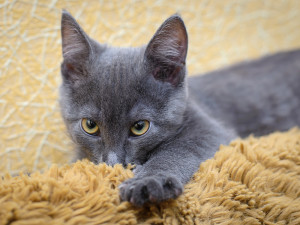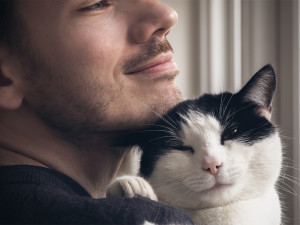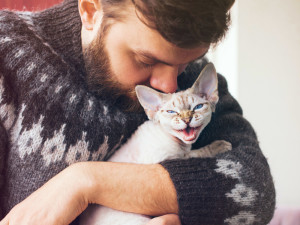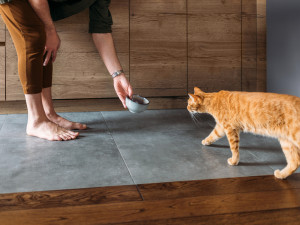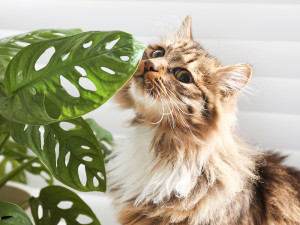Curious Cat Behaviour: Why Does My Cat Lick Me?
Hey, everybody’s got their thing
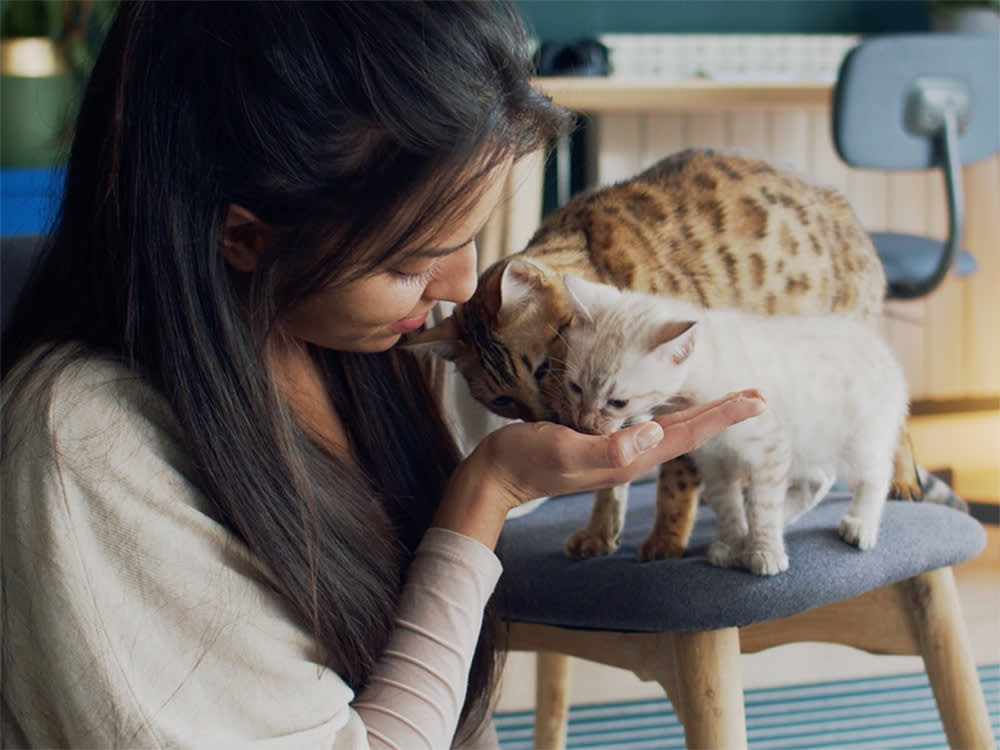
Share Article
Your cat likes to keep it clean. They might not be clean in the sense that they don’t swear; your cat probably internally says at least five explicit things to you before you even get out of bed in the morning. They’re clean in the sense that all day they sit in their precious sun spot and give themselves a bath with their little sandpaper tongue.
Sometimes, you swear they’re just doing this so they can ignore you even more. And then... the tongue makes its way over to you. Your cat is giving you a sandpaper bath on your arm or leg or – if there’s anything interesting there – face. Regardless of whether you’re into this particular action from your feline, why do they do it? What does it mean when cats lick you?

littleKin™ is Kinship’s home just for puppy and kitten parents. Bop over to check out expert advice, new pet tools, and special deals—all curated for your newest family member.
opens in a new tabIs it normal for cats to excessively lick their pet parents?
It’s totally normal for cats to lick their pet parents every once in a while – but it’s also possible for the behaviour to become obsessive. Dr Erin Katribe assures us that most of the time, licking is a sign of affection, so enjoy the sweet gesture. That said, before you let your cat lick you, consider that some sun creams and topical medications, such as hormone or steroid creams, can be toxic to cats if ingested. Licking should be off-limits if you use these products, at least until they are fully washed off.
If your cat’s licking behaviour has gone from, “Aw, why is my cat licking me?” to “Oh my gosh, my cat won’t stop licking me,” then there might be a problem. “I could envision a cat using the behaviour similarly to how they might overgroom themselves,” says Dr Katribe. “Any time licking seems excessive or is causing skin injuries, it could be problematic, and if the behaviour continues after the stressor is removed, it should be cause for concern.”
What are the reasons behind my cat’s constant licking behaviour?
OK, so it’s normal for cats to lick, but why do cats lick you? Below are some of the most common reasons why your cat has turned their sandpaper-y tongue in your direction.
1. They’re showing you some love by grooming you
“Grooming is a social activity for cats,” says Dr Katribe. “It’s an expression of comfort and companionship.” So unless you just took your hand out of a Doritos bag, it usually means your cat is showing you some love.
2. They could be marking their territory
Licking is also a way in which cats mark their territoriesopens in a new tab – each time your cat licks you, they leave their scent behind to let the rest of the feline kingdom know this is my human. “There is a scent component to saliva that cats can probably detect,” says Dr Katribe.
3. They may be trying to get your attention
Your cat could also be trying to get your attention – their sandpaper-like tongues are not exactly designed for soft kisses. Dr Katribe equates licking to other attention-getting behaviours such as rubbing up against you or winding between your feet. It’s up to you to figure out whether your cat wants affection, dinner or has a more pressing concern, like pain. That’s right, licking (you, themselves or inanimate objects) can be a common sign of painopens in a new tab in cats, so if your cat is still going at it even after you offered them love and food, it’s worth calling your vet.
4. It could be a coping mechanism
Your cat might act like they’re the one in control, but change can really stress them out. Grooming is supposed to be a soothing behaviour for cats so if it becomes excessiveopens in a new tab or obsessive – particularly after a shift in their environment, diet or living situation – this behaviour could be a cortisol-fuelled coping mechanism and should be addressed before it spirals.
Are there any strategies to discourage or redirect my cat's excessive licking?
Just like humans, cats can perform repetitive self-soothing motions excessively when they’re stressedopens in a new tab – and, as discussed, grooming themselves and others is a way cats soothe themselves. It’s possible your cat is anxious, bored or just wants more attention. Try spending more time with them doing enriching activities like playing and trick-training. Puzzle toys and feeders are a great way to keep your cat’s boredom at bay.
If they still seem a little lick-obsessed after some quality time, you can try calming treats or pheromone sprays. If that doesn’t work, you should visit your veterinarian to see how else you can ease your cat’s stress – it’s possible some cats need anxiety medicationopens in a new tab – and make sure there’s no other underlying problem at play.
Frequently asked questions
Is it normal for cats to excessively lick their pet parents?
While it’s totally normal for cats to lick their pet parents, excessive licking can be a sign of boredom, stress or even an underlying health problemopens in a new tab.
What are the reasons behind my cat’s constant licking behaviour?
There are several reasons why your cat might be licking you. They could be showing you affection, marking their territory, trying to get your attentionopens in a new tab, or trying to cope with stress.
Does my cat’s excessive licking indicate affection or something else?
Your cat’s licking most likely indicates affection, but if they’re licking excessively, it could be because of stress, boredom or a health problem.
Are there any health-related factors that could contribute to my cat’s excessive licking?
It’s possible that your cat’s excessive licking is due to an underlying health problem. Cats express pain in varied ways, and they may be trying to get your attention and help. If your cat is licking themself in the same place repeatedly, they might be feeling pain in that area.
Are there any strategies to discourage or redirect my cat’s excessive licking?
Try enrichment activities, such as playing and training, with your cat to prevent boredom. You can also try stress-relieving methods such as calming treats.
When should I be concerned about my cat’s excessive licking and seek veterinary advice?
If your cat’s licking seems compulsive – especially if they are licking parts of you or themself in a way that is painful – it’s important to address potential stress, boredom or health problems in your cat. You know your cat best: an extreme change in behaviour is almost always cause for concern.
References

Jodi Helmer
Jodi Helmer is a North Carolina-based freelance writer who shares her home with an embarrassing number of rescue dogs and relies on four feral cats to patrol the barn. When she isn’t refilling food and water dishes, Jodi writes about animals for Scientific American, Sierra, WebMD, AKC Family Dog, Living the Country Life, and Out Here.
Related articles
- opens in a new tab
Dream of High-Fiving Your Cat? Here’s How to Teach a Cat Tricks
It takes some patience (shocker), but it can be done
![cat meowing]() opens in a new tab
opens in a new tabThe Cat’s Meow – What Does it All Mean?
How to decode your cat’s love language when one meow has many meanings
![Profile view of a man giving a cat food to eat]() opens in a new tab
opens in a new tabWhy Is My New Cat Not Eating?
A veterinary nutritionist explains the causes, signs and treatment for how to increase their appetite
![Kim-Joy holding desserts in her hand while standing in front of a teal background]() opens in a new tab
opens in a new tabKim-Joy’s Rescue Cats Love To Watch Her Bake
The quirky, Insta-famous baker and The Great British Bake-Off star on her adopted kitten littermates and their fascination with watching her knead dough
![cat sniffing a plant]() opens in a new tab
opens in a new tab9 Plants Toxic to Cats
These plants might be beautiful, but they’re deadly to feline foragers
![Image from a scene of "Edgar G. Ulmer’s The Black Cat"]() opens in a new tab
opens in a new tabThe Bewitching History of Black Cats and Halloween
How witches, the original cat ladies, and their feline familiars became culturally bound to All Hallows’ Eve
